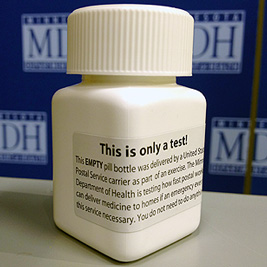Postal workers to deliver empty pill bottles Sunday as part of terror drill
Article by: Associated Press
Updated: May 3, 2012 - 6:23 AM
Workers with the U.S. Postal Service will deliver empty pill bottles to homes in the metro area Sunday in a drill to test how well they can deliver medicine in the event of a terror attack.
...
It's the country's first full-scale test for postal workers to distribute medicine in case of an anthrax outbreak or other medical emergency. Plans for similar practice runs are in the works in Boston, San Diego, Philadelphia and Louisville, Ky.
...
------------------------------------------------
Preparations nearing completion for May 6 test
of plan to distribute emergency meds using postal workers
?Operation Medicine Delivery? will mark culmination of multi-year planning effort
A new strategy for distributing medicine to the public in an emergency will be given its first full-scale test on May 6 in the Twin Cities.
On that day, U.S. Postal Service (USPS) personnel will make an unusual Sunday morning run through neighborhoods in four local ZIP codes. They will leave a simulated supply of the antibiotic doxycycline ? in the form of an empty pill bottle ? at each mailing address. About 37,000 households are expected to receive the simulated meds.
ZIP codes included in the exercise ? dubbed ?Operation Medicine Delivery? ? include 55101, 55102, 55411 and 55422. The target ZIP codes include portions of St. Paul, North Minneapolis, Robbinsdale, Crystal and Golden Valley. People in those ZIP codes will receive a mailing a few days before the exercise ? and a flyer along with the pill bottle ? explaining the purpose of the exercise.
?People who get the pill bottles don?t have to do anything,? said Jane Braun, Director of Emergency Preparedness at the Minnesota Department of Health (MDH). ?They can just recycle them. We just want people to know that this is an exercise, not a real emergency. We?re doing this so we can test our ability to distribute meds quickly using this strategy.?
Only residential addresses will get the simulated antibiotics, Braun said.
They will not be delivered to business or institutional addresses, or left in post office boxes.
Operation Medicine Delivery is the first full scale test of the Comprehensive Postal Plan for the Twin Cities, which has been in place since February 2010. The Postal Plan ? and the exercise ? represent the culmination of a multi-year planning effort that began in 2004. The project is being funded by the U.S. Department of Health and Human Services (DHHS), as part of its national emergency response planning efforts.
The postal delivery concept was pilot-tested earlier, on a limited basis, in Boston, Philadelphia and Seattle. However, the Twin Cities are the first metro area to mount a full scale test, using a fully developed plan and a full contingent of trained postal personnel. About 300 metro area postal workers have been trained to deliver meds as part of the Postal Plan.
Comprehensive postal plans are now being developed for previous pilot-test cities Boston and Philadelphia, as well as Louisville and San Diego.
The next step for those cities is a ?tabletop? exercise of their plans, involving a guided, step-by-step discussion of what would happen if their plans were implemented during a real emergency. The Twin Cities conducted a tabletop exercise of their plan in January 2011.
Both the plan and the exercise are joint projects of MDH, USPS, DHHS, and local public health, law enforcement and emergency management agencies. Local law enforcement will provide escorts for the postal delivery teams during the exercise, and would serve in the same role during a real emergency.
Hennepin County Human Services and Public Health, Minneapolis Public Health and Family Support, and Saint Paul-Ramsey County Public Health have been conducting community outreach efforts in neighborhoods where the exercise will take place, so residents will be aware of the exercise and its purpose. ECHO (Emergency, Community, Health, and Outreach), a non-profit organization specializing in communication with limited-English communities and other culturally diverse populations, has been collaborating with local public health agencies on the outreach efforts.
The Postal Plan is part of the Cities Readiness Initiative, a program for quickly providing medicine to residents of major metropolitan areas like Twin Cities, in an emergency. CRI might be activated, for example in response to a large scale airborne anthrax attack.
In an anthrax attack, it would be necessary to get large numbers of people on preventive medication within 48 hours. Local emergency medication centers, operated by local public health agencies, would be the primary means of getting medicine to people. However, postal distribution could also be used, on a supplemental basis, to take some of the pressure off of the medication centers.
-MDH-
Article by: Associated Press
Updated: May 3, 2012 - 6:23 AM
Workers with the U.S. Postal Service will deliver empty pill bottles to homes in the metro area Sunday in a drill to test how well they can deliver medicine in the event of a terror attack.
...
It's the country's first full-scale test for postal workers to distribute medicine in case of an anthrax outbreak or other medical emergency. Plans for similar practice runs are in the works in Boston, San Diego, Philadelphia and Louisville, Ky.
...
------------------------------------------------
Preparations nearing completion for May 6 test
of plan to distribute emergency meds using postal workers
?Operation Medicine Delivery? will mark culmination of multi-year planning effort
A new strategy for distributing medicine to the public in an emergency will be given its first full-scale test on May 6 in the Twin Cities.
On that day, U.S. Postal Service (USPS) personnel will make an unusual Sunday morning run through neighborhoods in four local ZIP codes. They will leave a simulated supply of the antibiotic doxycycline ? in the form of an empty pill bottle ? at each mailing address. About 37,000 households are expected to receive the simulated meds.
ZIP codes included in the exercise ? dubbed ?Operation Medicine Delivery? ? include 55101, 55102, 55411 and 55422. The target ZIP codes include portions of St. Paul, North Minneapolis, Robbinsdale, Crystal and Golden Valley. People in those ZIP codes will receive a mailing a few days before the exercise ? and a flyer along with the pill bottle ? explaining the purpose of the exercise.
?People who get the pill bottles don?t have to do anything,? said Jane Braun, Director of Emergency Preparedness at the Minnesota Department of Health (MDH). ?They can just recycle them. We just want people to know that this is an exercise, not a real emergency. We?re doing this so we can test our ability to distribute meds quickly using this strategy.?
Only residential addresses will get the simulated antibiotics, Braun said.
They will not be delivered to business or institutional addresses, or left in post office boxes.
Operation Medicine Delivery is the first full scale test of the Comprehensive Postal Plan for the Twin Cities, which has been in place since February 2010. The Postal Plan ? and the exercise ? represent the culmination of a multi-year planning effort that began in 2004. The project is being funded by the U.S. Department of Health and Human Services (DHHS), as part of its national emergency response planning efforts.
The postal delivery concept was pilot-tested earlier, on a limited basis, in Boston, Philadelphia and Seattle. However, the Twin Cities are the first metro area to mount a full scale test, using a fully developed plan and a full contingent of trained postal personnel. About 300 metro area postal workers have been trained to deliver meds as part of the Postal Plan.
Comprehensive postal plans are now being developed for previous pilot-test cities Boston and Philadelphia, as well as Louisville and San Diego.
The next step for those cities is a ?tabletop? exercise of their plans, involving a guided, step-by-step discussion of what would happen if their plans were implemented during a real emergency. The Twin Cities conducted a tabletop exercise of their plan in January 2011.
Both the plan and the exercise are joint projects of MDH, USPS, DHHS, and local public health, law enforcement and emergency management agencies. Local law enforcement will provide escorts for the postal delivery teams during the exercise, and would serve in the same role during a real emergency.
Hennepin County Human Services and Public Health, Minneapolis Public Health and Family Support, and Saint Paul-Ramsey County Public Health have been conducting community outreach efforts in neighborhoods where the exercise will take place, so residents will be aware of the exercise and its purpose. ECHO (Emergency, Community, Health, and Outreach), a non-profit organization specializing in communication with limited-English communities and other culturally diverse populations, has been collaborating with local public health agencies on the outreach efforts.
The Postal Plan is part of the Cities Readiness Initiative, a program for quickly providing medicine to residents of major metropolitan areas like Twin Cities, in an emergency. CRI might be activated, for example in response to a large scale airborne anthrax attack.
In an anthrax attack, it would be necessary to get large numbers of people on preventive medication within 48 hours. Local emergency medication centers, operated by local public health agencies, would be the primary means of getting medicine to people. However, postal distribution could also be used, on a supplemental basis, to take some of the pressure off of the medication centers.
-MDH-


Comment